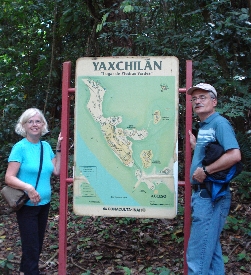WIU Professors Help Rural Development Center in Mexico
December 4, 2008

Ann Walsh and John Gruidl pause at the entrance to Yaxchilan, the site of an ancient Mayan city on the Usumacita River in Chiapas, along the Mexican/Guatemalan border.
[Download Print-Quality Image]
MACOMB, IL -- Can an idea, tried and tested in west central Illinois, work in remote southeastern Mexico, in the state of Chiapas? This is the question posed by Western Illinois University Professors John Gruidl and Ann Walsh during month-long assignments this fall at Universidad Technológica de la Selva (UTS) in Chiapas.
The idea is a simple one: to establish a university-based organization that helps rural communities and businesses. It would be similar to WIU's Illinois Institute for Rural Affairs (IIRA), which has worked with hundreds of communities in Illinois on community and economic development.
As part of the U.S.-Mexico Training, Internships, Exchanges and Scholarships (TIES) Partnership Initiative, "Capacity Building in Southern Mexico," an international, three-year project started in October 2006 and administered by WIU, Universidad Autónoma de Querétaro (UAQ) and UTS, Gruidl and Walsh, with funding from a U.S. Agency on International Development grant, have traveled to Chiapas several times.
This fall, they had month-long assignments working with UTS in Ocosingo (Chiapas). Their goal was to help UTS establish a Center for Rural Development on its campus, similar to the IIRA, with a mission to help communities and producers in the region.
Of course, Chiapas is a different environment from west central Illinois, Gruidl acknowledged. Instead of flat or gently rolling fields, Chiapas is full of cloud-topped mountains, dense jungles, waterfalls, lakes and forests. Instead of growing corn and soybeans, the region of Chiapas is an abundant producer of coffee, tropical fruits (such as mangos and bananas), honey, milk and cheese.
"We knew that we could not simply duplicate the IIRA," Gruidl said. "We had to work with the faculty to make changes that would work for Chiapas and the way things are there."
But similar to west central Illinois is the economy in Chiapas -- it depends on small producers, especially the production of coffee and cheese, and on small eco-tourist centers that host visitors. UTS is already providing technical assistance and training through its new center to help small producers boost their production and incomes. In turn, this will benefit families and communities throughout the region, Gruidl explained.
After spending some time in Chiapas, the professors also recognized how Illinois and Chiapas are historically significant to their respective countries.
"Just as Illinois has Lincoln, Chiapas has the Mayan ruins. A center of the Mayan empire was located in Chiapas, and there are magnificent ruins still standing," Gruidl said. "The potential for tourism and the economic impact that comes with it is huge. But tourism has to be done in a way that maintains the pristine environment."
Both Gruidl and Walsh brought specific expertise to UTS. Gruidl's work at the IIRA was useful in providing knowledge of how a university outreach center is organized and managed. Walsh, who is a professor in the marketing and finance department in WIU's College of Business and Technology (CBT), advised UTS how to market the new center. She also assisted several producer groups and helped them strengthen the marketing of their products.
"Working with the Chiapas producers and UTS faculty reminded me of how similar our situations are. Like the rural producers in Illinois, the Chiapas producers face the same marketing issues: who are their customers and how can they reach them? What has changed is the rapid development of international economy. A few years ago, none of us involved in rural development could have imagined ourselves seeking global markets and working with international colleagues and producers," Walsh said.
"Our UTS colleagues are wonderful, welcoming people, and it is a joy to work with them.
added Gruidl. "We are simply trying to help them put into place their vision of a Center for Rural Development. We have learned as much or more from them as they have learned from us."
The Capacity Building in Southern Mexico project is directed by Win Phippen, associate professor at Western, and Chris Merrett, director of the IIRA at WIU. The project is also supported by Carol Fimmen, director of Global Education in the cCollege of Business and Technology.
For more information, contact Gruidl at (309) 298-2984 or JJ-Gruidl@wiu.edu. Information is also available online at wiu.edu/globaled/cbuilding/index.php Visit the IIRA online at www.iira.org.
Posted By: University Communications (U-Communications@wiu.edu)
Office of University Communications & Marketing

Connect with us: